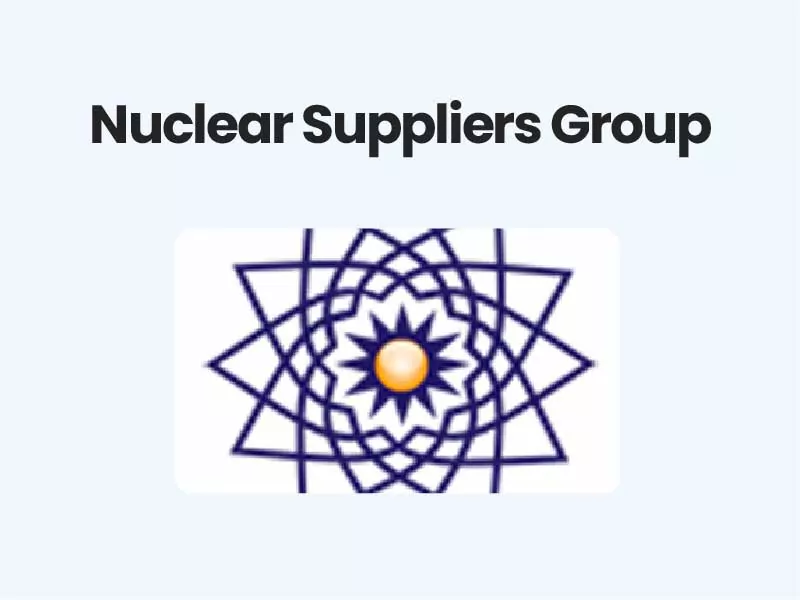Companion@360 → 7 Month programme to sharpen your writing skills → REGISTER NOW

The Nuclear Suppliers Group (NSG)
The Nuclear Suppliers Group (NSG) is a group of nuclear supplier countries that seeks to contribute to the non-proliferation of nuclear weapons through the implementation of two sets of Guidelines for nuclear exports and nuclear-related exports. It was brought in 1974– in response to the Indian nuclear test (smiling Buddha).
It is a multilateral export control regime. The NSG first met on November 1975 in London, and is thus popularly referred to as the “London Club”. It is not a formal organization, and its guidelines are not binding. Decisions, including on membership, are made by consensus. Overall responsibility for activities lies within NSG Plenary meetings that are held once a year. A rotating Chair has the overall responsibility for the coordination of work and outreach activities.
There are currently 48 Participating Governments (PGs) of the NSG. The NSG Chair Country (2019-20) is Kazakhstan and the European Commission and the Chair of the Zangger Committee participate as observers.
- The NSG Guidelines also contain the so-called “Non-Proliferation Principle,” adopted in 1994, whereby a supplier, notwithstanding other provisions in the NSG Guidelines, authorizes a transfer only when satisfied that the transfer would not contribute to the proliferation of nuclear weapons.
- The Non-Proliferation Principle seeks to cover the rare but important cases where adherence to the NPT or to a Nuclear Weapon Free Zone Treaty may not by itself be a guarantee that a State will consistently share the objectives of the Treaty or that it will remain in compliance with its Treaty obligations.
- The NSG Guidelines are implemented by each Participating Government (PG) in accordance with its national laws and practices.
- Decisions on export applications are taken at the national level in accordance with national export licensing requirements.
Read Also Terrorism Financing
Factors are taken into account for participation
- Be able to supply items (includes transit items) covered by the Annexes to Parts 1 and 2 of the Guidelines;
- Adhere to and act in accordance with the Guidelines;
- Have in force a legally -based domestic export control system that gives effect to the commitment to act in accordance with the Guidelines;
- Be a party to the NPT, the Treaties of Tlatelolco, Rarotonga, Pelindaba, Bangkok, or Semipalatinsk, or an equivalent international nuclear non-proliferation agreement, and in full compliance with the obligations of such agreement(s), and, as appropriate, have in force a full-scope safeguards agreement with the IAEA;
- Be supportive of international efforts towards the non-proliferation of weapons of mass destruction and of their delivery vehicles.
India and NSG
- India and Pakistan are non-signatories to NPT (Nuclear Non-Proliferation Treaty).
- China has been objecting to India’s participation in the grouping since May 2016 when India applied for the membership of the NSG.
- China has been firm on its stand that only those countries which have signed the NPT should be allowed to enter the organization.
- China wants to block the entry of India in any way while other remaining countries like New Zealand, Ireland and Austria said that they are opposing Indian entry because India did not sign on Non-Proliferation Treaty (NPT).
- Majority of the NSG member states including the US, Russia, Iceland, Denmark, Finland, Sweden and Norway back for India’s membership in the grouping considering its non-proliferation record.
The benefit of India’s NSG membership
- India is keen to become a member of NSG as it seeks to significantly expand its nuclear power generation and also enter the export market in the coming years.
- Access to technology will boost the economic growth of India.
- If India becomes the member of the Nuclear Suppliers Group; it will have greater access to uranium than it does currently under its 2008 agreement with the USA.
- In addition to this India will be able to import uranium from other countries to boost up its energy security.
- India will get an opportunity to voice its concern if in case of a change in the provision of the NSG guidelines.
Factors in favour of India’s membership
- France got membership in the elite group without signing the NPT.
- Commitment to nonproliferation: India’s commitment to bifurcate its civilian and military nuclear programs along with its nonproliferation record ensured indigenously developed technology is not shared with other countries.
- Transparency: India has also ratified an Additional Protocol with the International Atomic Energy Agency (IAEA) which means that its civilian reactors are under IAEA safeguards and open for inspections.
UPSC Mains 2019 General Studies Paper 1 Question
Conclusion
The recently framed draft proposal for accepting new members into the Nuclear Suppliers Group increases India’s chances of entry into NSG. It’s a welcome development for India as NSG membership would definitely boost the economic and strategic development in the future.
Therefore, India should take up this opportunity to aggressively pursue the development of nuclear energy while providing the essential emphasis on safety and addressing concerns of the public. It will also pave the way for clean energy initiatives and continued focus to achieve our commitments to reduce the carbon footprint pledged during the climate summit.
